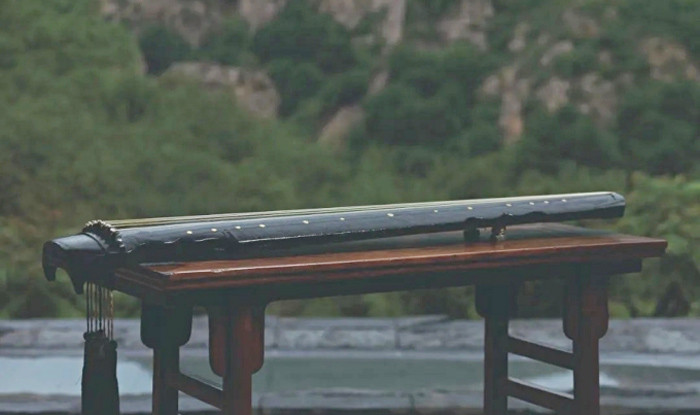The zither of Zhou Quan, a prince who participated in overthrowing the Ming Dynasty, attracted attention when it appeared on the auction market.
According to The Value, at the auction organized by Poly in Beijing on July 6, Zhou Quan's guqin was hammered at approximately 42 million yuan (5.9 million USD), with a starting price of 8 million yuan.
This is the only instrument made by Zhou Quan (1378-1448) that is still preserved in the world. The work was once owned by the Gu Mei Geng family - a famous musical family in China.
The wooden instrument is named Phi Bao Lien Chau, 118 cm long and 20 cm wide. After being repaired, the instrument is still usable. Before hammering, the auction house invited the artisan to perform with the instrument.
The guqin was improved by Zhou Quan from an instrument originating from the Sui Dynasty. The name Fei Bao Lian Zhou means that the sound of the guqin is like falling pearls. Before this auction, several guqins were sold at high prices. The record for the most expensive guqin in China was set in 2010, when a piece made by Emperor Huizong of Song, inscribed by Qianlong, was sold for nearly 140 million yuan (US$19.6 million).
Phi Bao Lien Chau is related to the life story of a talented prince of the Ming Dynasty. Chu Quyen was the 17th son of the founding emperor Chu Nguyen Chuong. After ascending the throne, Chu Nguyen Chuong appointed more than 20 princes as princes in the regions, in order to consolidate the Chu dynasty. Among them, Chu Quyen was appointed as King Ninh Hien, and the fourth prince Chu De was appointed as King Yen.

The instrument made by Chu Quyen
Zhu Yuanzhang chose his eldest son, Zhu Xiao, as crown prince, but Zhu Xiao died early. Therefore, Zhu Xiao's son, Zhu Yunwen, ascended the throne, with the title Jianwen Emperor.
Fearing that his uncles would rebel while holding military power, Emperor Jianwen stripped several princes of their titles. This action made the remaining princes wary and wary of Emperor Jianwen. The first to launch a rebellion was King Yan. In the war between Emperor Jianwen and King Yan, Zhou Quan became the "trump card" that could change the situation, because he possessed a powerful army.
Emperor Jianwen feared that Zhou Quan would cooperate with King Yan, so he summoned him to the capital for an audience. Zhou Quan was worried that he would be stripped of his throne if he returned to the capital, so he disobeyed the king's order. At that time, seeing that the situation was not yet clear, he maintained a neutral position, not actively taking sides with anyone.
However, falling for King Yan's plan, Zhou Quan eventually joined his brother's army. According to the Ming History, King Yan promised that after the great event was successful, he and Zhou Quan would rule the world together.
King Yan usurped the throne and ascended the throne, with the title Yongle. Not wanting to repeat the mistake of his nephew Jianwen Emperor, Yongle increased the concentration of power. He stripped Zhou Quan of his power and controlled his younger brother.
Knowing that his brother doubted him, Chu Quyen withdrew into himself, spending his days with lutes and books to preserve his life. He gave himself new nicknames, such as Cu Tien and Van Yem Dao Nhan, to express that the prince who controlled a powerful army now only put his feelings into clouds, cranes, and art.
After giving up his political ambitions, Zhou Quan wrote history, plays, and studied music, tea ceremony, Taoism, agriculture, and medicine. The prince was passionate about the ancient zither and compiled books such as the Mysterious Secrets of the Mysterious Music and the Taihe Zhengyin Composition. The Mysterious Secrets of the Mysterious Music is one of the oldest surviving music scores in China.
At the end of his life, Zhou Quan did not encounter any major disasters. He passed away in 1488 at the age of 70. His books hold an important position in art research, among which the work Tea Pu compiled by the prince is of great value to Chinese tea culture.
According to VnExpress